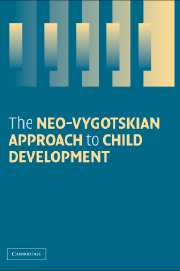Book contents
- Frontmatter
- Dedication
- Contents
- List of Figures
- Acknowledgments
- Introduction: The Problem of Determinants and Mechanisms of Child Development; The Structure and Content of the Book
- 1 Vygotsky's Approach to Child Development
- 2 The Neo-Vygotskian Elaboration of Vygotsky's Approach to Child Development
- 3 First Year of Life: Emotional Interactions With Caregivers as the Leading Activity of Infants
- 4 Second and Third Years of Life: Object-Centered Joint Activity With Adults as the Leading Activity of Toddlers
- 5 Three- to Six-Year-Olds: Sociodramatic Play as the Leading Activity During the Period of Early Childhood
- 6 The Period of Middle Childhood: Learning at School as Children's Leading Activity
- 7 The Period of Adolescence: Interactions With Peers as the Leading Activity of Adolescents
- Conclusion The Neo-Vygotskian Approach to Child Development: Accomplishments and Shortcomings
- References
- Author Index
- Subject Index
Introduction: The Problem of Determinants and Mechanisms of Child Development; The Structure and Content of the Book
Published online by Cambridge University Press: 05 August 2014
- Frontmatter
- Dedication
- Contents
- List of Figures
- Acknowledgments
- Introduction: The Problem of Determinants and Mechanisms of Child Development; The Structure and Content of the Book
- 1 Vygotsky's Approach to Child Development
- 2 The Neo-Vygotskian Elaboration of Vygotsky's Approach to Child Development
- 3 First Year of Life: Emotional Interactions With Caregivers as the Leading Activity of Infants
- 4 Second and Third Years of Life: Object-Centered Joint Activity With Adults as the Leading Activity of Toddlers
- 5 Three- to Six-Year-Olds: Sociodramatic Play as the Leading Activity During the Period of Early Childhood
- 6 The Period of Middle Childhood: Learning at School as Children's Leading Activity
- 7 The Period of Adolescence: Interactions With Peers as the Leading Activity of Adolescents
- Conclusion The Neo-Vygotskian Approach to Child Development: Accomplishments and Shortcomings
- References
- Author Index
- Subject Index
Summary
Having reviewed studies in the field of developmental psychology, Hetherington and McIntyre (1975) came to a sad conclusion:
Perhaps the most marked feature in the field of developmental psychology is the lack of satisfactory theories of child development. Many investigators seem to have coped with this problem by doing completely atheoretical research; others are busy patching, mending, and modifying old theories; and some are building mini-theories that deal with very restricted areas of behavior. Although some modest theoretical convergence between areas is occurring, notably in the increased awareness of the role of cognitive factors in a variety of behaviors, one comes away from a review of the literature feeling that developmental psychologists working in different areas don't talk to each other. … The literature is replete with highly redundant, often trivial research or “single shot” studies that add little to our understanding of developmental processes. It seems to be an ineficient approach to the study of children's behavior. … The current need is for a careful analysis, synthesis, and evaluation of the information we now have and an attempt to evolve theories which will result in more systematic and fruitful strategies of research.
(pp. 125–126)This comment on the absence of a satisfactory theory of child development in Western developmental psychology of the 1970s is also applicable to the current state of developmental psychology in the West. In contemporary Western psychology, there are detailed studies of the development of perception, memory, cognition, and other mental processes in each period of the child's life.
- Type
- Chapter
- Information
- The Neo-Vygotskian Approach to Child Development , pp. 1 - 14Publisher: Cambridge University PressPrint publication year: 2005



